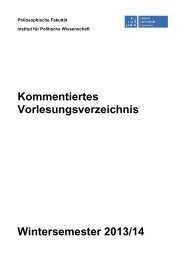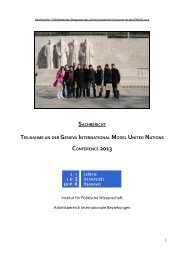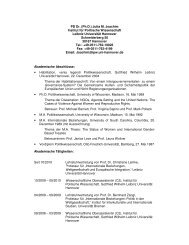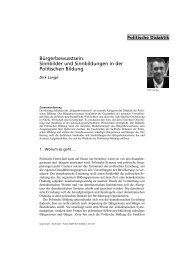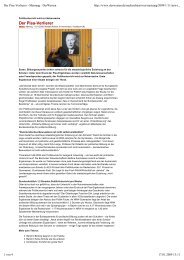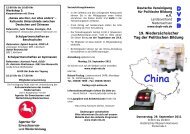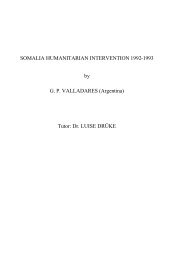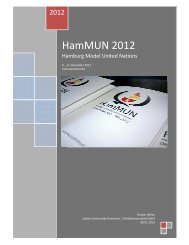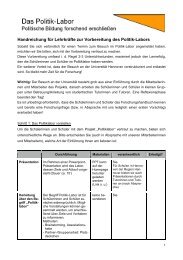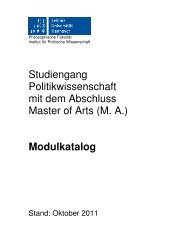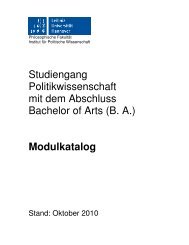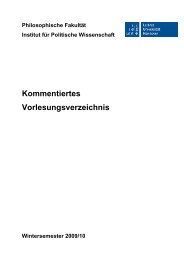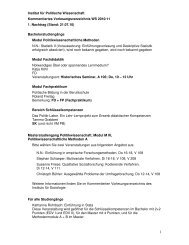Preventive Action for Refugee Producing Situations
Preventive Action for Refugee Producing Situations
Preventive Action for Refugee Producing Situations
You also want an ePaper? Increase the reach of your titles
YUMPU automatically turns print PDFs into web optimized ePapers that Google loves.
214 Chapter 5<br />
Secretary-General to go on special missions to offer the international<br />
community's services, investigate alleged violations, and develop activities<br />
with governments. 522<br />
3) 1982-1987: Model implementing and testing. During this time the models<br />
developed over the preceding period by the Centre <strong>for</strong> Human Rights were first<br />
put into practice. Where necessary and appropriate, adaptations were made to<br />
help promote the development of national infrastructures <strong>for</strong> constitutional,<br />
investigative, judicial, teaching, and dissemination activities. 523<br />
4) 1988 on: Reflection and evaluation. Increasing global interdependence<br />
has <strong>for</strong>ced sovereign states to take into account the international community's<br />
concern in the area of human rights.<br />
There is no way of isolating oneself from the effects from gross violations<br />
abroad; they breed refugees, exiles, and dissidents who come knocking at our<br />
doors - and we must choose between bolting the doors, thus increasing misery<br />
and violence outside, and opening them, at some cost to our own well being. 524<br />
Even though the drafters of the UN Charter rejected the notion of "protection"<br />
of human rights, preferring the term "promotion," in practice the U.N. has been<br />
involved in protection measures over the last <strong>for</strong>ty years. Aside from the legal<br />
instruments, which are en<strong>for</strong>ceable among states that ratified them, coalition<br />
building <strong>for</strong> specific new proposals has made it difficult <strong>for</strong> individual states to<br />
resist allowing the U.N. some role in their internal affairs, especially if massive<br />
violations of human rights can be established. Such concessions have<br />
contributed to the shrinking of domestic jurisdiction in the field of international<br />
human rights. By the same token this U.N. practice extends the UN's<br />
jurisdiction into their internal affairs. By agreeing to binding treaties, states<br />
must accept interference in their internal affairs. The eminent British scholar<br />
Hersch Lauterpacht judges these conflicting claims:<br />
______________________<br />
522 The fact-finding by these special rapporteurs has not always functioned as well as<br />
would be desirable, since some of the rapporteurs tend to see their role more as<br />
diplomatic than investigative. Ramcharan, "Reflections," Lecture, Harvard Law<br />
School, Cambridge, 17 September 1988.<br />
523 United Nations Association, A Successor Vision: The United Nations of<br />
Tomorrow, (New York: UNA, 1987), p. 32.<br />
524 Stanley Hoffmann, "Duties beyond borders: On the limits and possibilities of<br />
ethical politics", p. Ill, as quoted in Kühnhardt, Die Universalität der Menschenrechte,<br />
Olzog, München, 1987, p. 362.<br />
Legal Justification 215<br />
Once States agreed that questions should <strong>for</strong>m the subject of Declaration or<br />
Convention, they clearly placed them outside their 'domestic jurisdiction' and article<br />
2 paragraph 7 became inapplicable. 525<br />
States show a greater willingness to cooperate with the Secretary-General in<br />
permitting international measures to be taken within their borders than ever<br />
be<strong>for</strong>e. Facts of such practice speak <strong>for</strong> themselves. 526 For example, in the<br />
recent Iran-Iraq war, the UN was able to investigate the use of chemical<br />
weapons, 527 look into the prisoner of war situation, 528 and make arrangements<br />
to establish protection <strong>for</strong> civilians 529 - all without an explicit mandate.<br />
Not only have states allowed UN and other organizations to take action<br />
within their territories, but some, such as the Federal Republic of Germany<br />
and Canada have initiated measures themselves to promote human rights in<br />
the developing nations. 530<br />
Still, in taking these actions on their own, rather than under the general<br />
auspices of the U.N., states will invariably risk being accused under Art. 2(7)<br />
by the government in question of intervening into its internal af-<br />
_______________________<br />
525 Hersh Lauterpacht, International Law and Human Rights, 1950, p. 213, as<br />
quoted in Rumpf, p. 18. For a discussion of nonintervention in Art 2(7), see<br />
Section 5.2. above.<br />
526 "The power to bring matters to the attention of the Security Council or the<br />
Assembly has been interpreted to imply the power, which the Secretary-General<br />
has frequently exercised, to make such inquiries and investigations to in<strong>for</strong>m the<br />
appropriate organ of the matter in question." Hans Kelsen, Principles of<br />
International Law, (New York, 1966), p. 281.<br />
527 "UN says Iraq used poison gas in air raid," Boston Globe, 24 August 1988.<br />
528 "U.N. Team to Visit Gulf War Prisoners," The New York Times, 24 July 1988.<br />
529 Ramcharan, "Reflection," Lecture, 17 September 1988.<br />
530 Different ways and levels can be used: "Persönlicher Einsatz für einzelne oder<br />
Gruppen von Opfern, einschließlich der Aufnahme von politischen Flüchtlingen;<br />
vertrauliches Vorstelligwerden bei der Botschaft in Bonn, durch den eigenen<br />
Botschafter im Zielland oder im Rahmen von offiziellen Besuchen; allgemein<br />
gehaltene Bekundungen, man sei über die Lage im Lande "besorgt"<br />
(Pressemitteilungen, Reden bei internationalen Konferenzen etc.), und<br />
öffentliche Stellungnahmen, die die Regierungspolitik des Ziellandes direkt<br />
kritisieren." Der damalige Staatsminister im Auswärtigen Amt, Klaus von<br />
Dohnanyi meinte "Die Bundesrepublik Deutschland ist heute stark genug, um es<br />
sich leisten zu können, durch ihre Diplomaten und politischen Repräsentanten<br />
leise, aber energisch und zielbewußt in Menschenrechtsfragen vorstellig zu<br />
werden. Wenn wir dies tun, kann es sich dabei auch nicht um die Einmischung<br />
in die inneren Angelegenheiten anderer Länder handeln: Menschenrechte sind<br />
eine internationale Verantwortung." See Heinz, Menschenrechte in der Dritten<br />
Welt, 1986, pp. 33,37.



